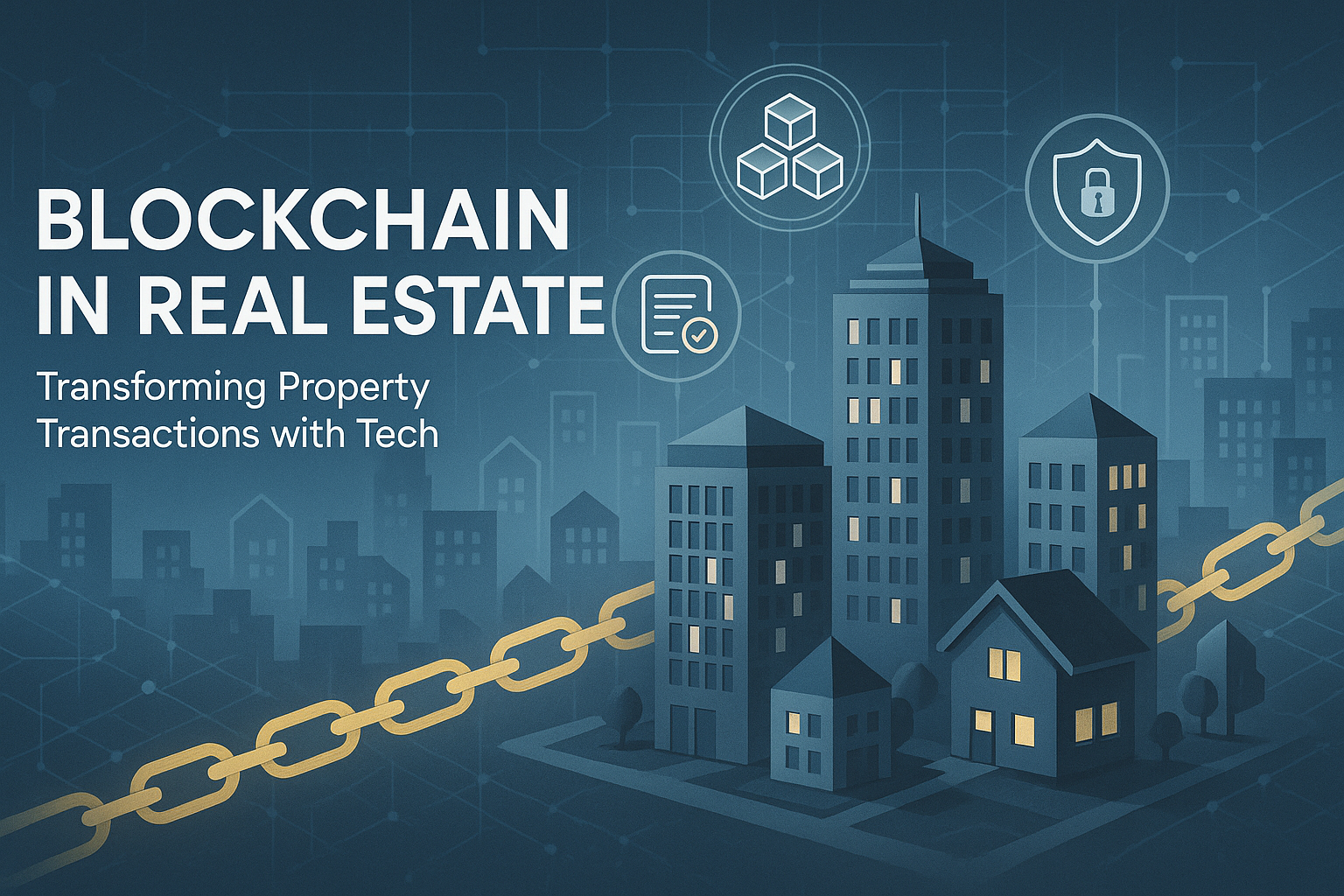The real estate world is changing fast. New technology is helping buyers, sellers, and investors work faster and smarter. One such game-changing technology is blockchain. It’s not just for cryptocurrencies anymore. Today, it’s being used in housing, rentals, and property deals. In this blog, we’ll explore how blockchain real estate systems work, how they are being used, and why the industry is starting to trust them. If you’ve heard about it but don’t know what it means for you, this is the place to start.
What is Blockchain in Simple Words?
Blockchain is like a digital notebook that no one can change or erase. Every time a transaction happens, it is recorded in a block. These blocks are linked together in a line (or chain), and everyone in the network can see them. That’s why it’s called blockchain.
In blockchain real estate, this technology helps track property records, payments, and deals. It makes everything more secure and transparent.
How is Blockchain Used in the Real Estate Industry?
Blockchain is used in real estate to make transactions easier, faster, and safer. It removes middlemen, protects records, and reduces the time spent on paperwork. Below are the most powerful real estate blockchain use cases shaping the property industry today.
1. Faster and Safer Property Transactions
Buying or selling property usually takes a lot of time. There are many people involved like agents, banks, lawyers, and government offices. With blockchain property transactions, all the details can be stored and shared on a digital ledger.
Contracts can be signed digitally and securely. Ownership changes are tracked instantly. The process becomes faster with fewer middlemen and fewer delays. Everything happens in real-time with minimal back-and-forth.
2. Property Tokenization
This is one of the most exciting real estate blockchain use cases. Let’s say a house is worth ₹1 crore. With property tokenization, the house can be split into digital shares. Each share has value and can be bought or sold by investors.
You don’t need crores to invest anymore. You can own a part of a building with smaller amounts. This allows more people to enter the real estate market and makes buying and selling easier for investors.
3. Transparent Ownership Records
A major issue in the real estate world is fake ownership papers. Many people have been tricked into buying land that someone else already owns. With blockchain property, this risk is reduced.
Ownership records are stored in a digital ledger that cannot be changed. Everyone can check the real owner before making a deal. This reduces fraud and builds trust in the process.
4. Smart Contracts for Rentals
Smart contracts are like self-running agreements. When both parties agree, the contract carries out actions automatically. For rentals, that means when a tenant pays rent, the contract grants access or sends receipts.
These smart contracts make rental deals clear and fair. Deposits can be refunded automatically. Late payments can trigger reminders. This is a great example of blockchain property transactions at work.
5. Land Registry and Title Management
Many places still store land records on paper. These papers can be damaged, lost, or faked. With blockchain real estate systems, land titles can be stored digitally.
This keeps them safe, unchangeable, and always traceable. Governments can also reduce manual errors and make ownership records easily accessible.
Blockchain for Real Estate India: A Growing Trend
India’s real estate market is large but full of paperwork and delays. Blockchain for real estate India is gaining interest due to its ability to clean up old systems.
State governments are testing blockchain-based land records. Property startups are also offering blockchain-backed transactions and rental platforms. These tools bring more transparency and make real estate fair for all.
Advantages of Blockchain in Real Estate
Let’s look at the biggest benefits of using blockchain in property management:
Improved Security
Blockchain uses encryption to protect every record. Once a transaction is added, it cannot be edited or deleted. This prevents tampering, fraud, and data loss. For property deals, this means your ownership documents and contracts are always safe and trustworthy.
Lower Costs
Real estate deals often involve middlemen like agents, brokers, and legal teams. Blockchain reduces the need for many of these roles by automating tasks. This leads to fewer commission fees, less paperwork, and lower overall transaction costs for buyers and sellers.
Speed
Traditional property sales can take weeks or even months. Blockchain allows transactions to happen in real time. Smart contracts automatically verify and process deals, reducing wait times and delays caused by banks, legal checks, or manual approvals.
Transparency
Every party involved in a transaction can see the same blockchain record. This avoids miscommunication and hidden clauses. Whether you’re a buyer, seller, or investor, you can trust that the details are honest, visible, and permanent on the chain.
Better Access to Investment
Property tokenization allows investors to buy fractional shares in properties. This lowers the entry barrier, so even people with smaller budgets can invest in real estate. It’s a smart way to grow wealth without owning an entire building.
Easy Auditing and Verification
Blockchain keeps a clear, time-stamped record of every action. Auditors and legal experts can trace the full transaction history without delay. This is useful during disputes, inspections, or legal processes, making the system more accountable and reliable.
Reduced Risk of Fraud
Forgery and fake documents are a big issue in real estate. Blockchain reduces this risk by creating a permanent record of ownership and transactions. This makes it hard for anyone to sell a property they don’t legally own.
Global Accessibility
Since blockchain is digital and borderless, international buyers can invest in properties from anywhere. It supports global real estate markets by removing local restrictions, speeding up cross-border transactions, and allowing easier ownership transfers between countries.
Real Examples Around the World
Here are some examples showing real-world use of blockchain in real estate:
- Sweden uses blockchain for land titles and ownership history.
- Dubai runs blockchain-based smart city projects, including property deals.
- In the US, startups have sold tokenized houses that allow shared ownership.
These projects prove that blockchain in real estate systems are more than just an idea they are already being used.
Challenges to Keep in Mind
Blockchain also faces some hurdles like any new technology:
- People are still learning how it works.
- Legal rules for blockchain property transactions are not yet clear in many countries.
- Setting up blockchain systems can cost a lot at first.
But these are early-stage problems. With time, the real estate industry will adjust and grow with blockchain.
Conclusion
Blockchain is bringing big changes to the property market. It helps speed up transactions, stops fraud, and allows small investors to join through property tokenization. Governments, investors, and buyers are all finding ways to use this technology better.
As adoption grows, businesses that use blockchain will stay ahead. Companies like Bolder Technologies are keeping up with these changes to deliver smarter, safer property solutions for the future.
Need Help Integrating APIs?
Let us handle the tech so you can focus on growing your business.
🚀 Book a Free Consultation
